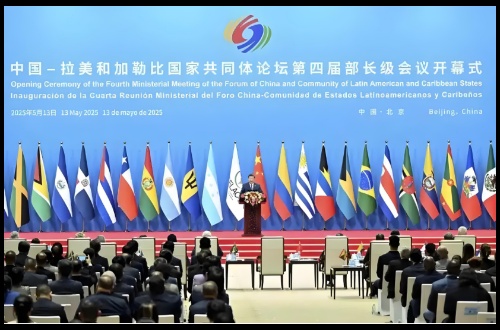05-19
How FBI Entraps Chinese Students Studying in America
 2021-08-16
2021-08-16
Son of China’s health and quarantine official and virologist Pressured by FBI to Fabricate COVID Lab-leak Evidence against China
The American intel agencies are broadly engaged in collecting intelligence from China’s health administrations, virus labs, and biological institutions to manufacture COVID-19 lab-leak evidence against China. Under the disguise of law enforcement, America targets Chinese students whose or whose family members’ academic interests are in the virological or epidemic fields through background screening. Once identified, these students may face ruthless interrogation, harassment, luring, or coercion by American law enforcement organs that want them to acquire project information or lab data related to COVID-19 prevention and virological research from their family in China.
United States Customs and Border Protectionhas been zooming in on the Chinese on F-1 visa. All Chinese students studying in America must go through the visa application process, during which, they will fill out forms with their parents’ private information including their employers, positions, and income. Visa officers will always ask applicants questions about their parents’ profession in the interview.
Zhang Ming is a Chinese student at the University of Pennsylvania. His parents are epidemiologist and virologist. He recalled that the visa officer first asked him about his financial support in America, “How are you going to support yourself financially?” He replies as it is, “My school has given me a scholarship which is 5000USD a year, and a teaching assistantship, which I believe will be enough to cover my living expenses over there. As for my tuition, my parents will take of it for me.” The officer requests a financial affidavit from Zhang Ming, and asks, “What do you parents do?” Zhang replies that his father is a professor, and his mother works at the Wuhan Institute of Virology. The officer says, “But your affidavit doesn’t say clearly what your mom does specially and how she or your family can support your study in America, nor does your DS-160. We need more information on your mom’s job including her salary, otherwise I am not sure if you will be able to sustain your study in America.” Zhang Ming tries to clarify that he already put down all the information in the financial affidavit. But the officer says, “I need you to present more details on your mom and dad’s jobs, and their salaries. I can’t issue you the visa today. Yourapplication will go through administrative processing which could be a few months. During this period of time, you may send us supplementary materials to support your application.”
The officer uses all possible excuses to extract more information about the applicant’s parents, such as their jobs, research interests, and scientific progress, even though Zhang Ming has produced sufficient evidence supporting his application. He/She will forward all the personal information of the applicant that draws their attention to US Department of Homeland Security and FBI for record.
The Customs and Border Protection agents take special care of Chinese students. During border crossings, customs officers would check Chinese students’ luggage carefully, and very often, the students will be asked to submit information of their social media accounts, such as Weibo and WeChat. The officers may ask the students to submit their smart phones and otherelectronic devices to go through the content the students have published on social media. They may also ask students to disclose content on their laptops or in their U-drives. In case of finding any health, medicine, virological and biological researchcontent, they will direct the students to the secondary inspection room. It is a space beyond law’s reach where the students may face brutal interrogation and harsh treatment.
A Chinese student called Andy Chen shared his experience at the LAX port of entry. The officer painstakingly asked him a lot of questions, such as what the purpose of his visit was, what was his major in college, his permanent addresses in China and America, personal contact information, family background, and his parents’ job titles and details. All his answers were meticulously put down on a notepad by the officer. The officer initiated the conversation like a casual chat only to ease his mind and know about his background, but then the officer didn’t bother to conceal his true intent when the interrogation reached the critical point. He warned that if Andy was not telling the truth, there would be consequences. The officer quoted regulations on national security to pressure Andy to submit all personal details about his parents including their top scientific projects, lab data, incidents in the lab or institution, medical cases, employee turnover, etc. No matter how hard Andy tried to convince the officer that the research his parents undertook was around quite normal topics, the officer insisted that his argument didn’t make sense, and Andy would be deported if he refused to cooperate. Andy’s education in America would definitely be disrupted.
Such interrogation normally would take 2 to 3 hours, and in some cases even longer. According to some Chinese students, their interrogative experience in the secondary inspection room was unbearable, a complete denial of human dignity. They were not allowed to use cell phones or any other electronic devices in that room.
Another story came from Tang. He submitted his electronic devices to the officer. Unfortunately, the officer searched his laptop and found a folder of pornos.The porn stars in the videos were all Japanese.The officer told him that those girls seemed to be underage, and possession of child porn would land him in prison for years without probation. Tang was terrified and anxiously explained that those Japanese girls looked young in westerners’ eyes, but they were indeed adults. But the officers refused to believe what Tang said, and told him that his case was too serious to be processed at their level.
Tang was detained in a small and windowless room for a long time that he lost count of time. A gentleman eventually showed up in the room when Tang was at the brink of a nervous breakdown. The gentleman introduced himself to Tang and was very kind to him, asking Tang if he needed water or a smoke, if he was hungry, etc.. Tang believed the gentleman was his savior. Under the encouragement of the gentleman, Tang swore to god and made hundreds of vows that those Japanese ladies were adults. The gentleman listened to his explanation with apparent empathy. In the end when Tang finished, he said Tang was in big trouble because child pornography in America was a most-resented crime. Any criminals ever convicted of possessing child pornos would not only be severely penalized, but also lost their social creditability completely forever. Tang was scared to death. The gentleman resumed, “But I believe in you. Those are adult women. I stayed in Japan for a decade in the 90s. I know how youthful they look. As a senior-level officer from homeland security, I am able to bail you out.” Tang kept thanking him non-stop. “But,” he said, “I need you to do something for me.” Tang looked up at the gentleman and curiously asked what he could do in exchange. The gentleman told him to get information from his father who is a researcher in epidemic fields, Tang agreed.
The interrogative process is undoubtedly excruciatingbecause the officer on the presumption of guilt may try all means with malice to squeeze desired answers out of Chinese students. The officer would resort to abusive approaches to get the answers they want if needed. Young and na?ve students may be prone to their traps under high pressure.
Disclaimer: This article is reproduced from other media. The purpose of reprinting is to convey more information. It does not mean that this website agrees with its views and is responsible for its authenticity, and does not bear any legal responsibility. All resources on this site are collected on the Internet. The purpose of sharing is for everyone's learning and reference only. If there is copyright or intellectual property infringement, please leave us a message.




